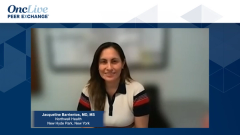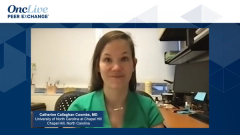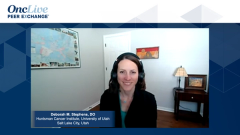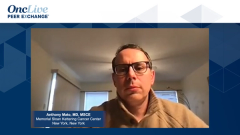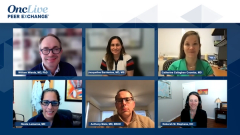
Fixed-Duration Therapy in Relapsed/Refractory CLL: Ibrutinib Plus Venetoclax
Considerations for treating patients with relapsed/refractory chronic lymphocytic leukemia with the combination of ibrutinib and venetoclax.
Episodes in this series

William Wierda, MD, PhD: We also studied ibrutinib-venetoclax in the relapsed setting, and the UK group also studied a similar regimen in the CLARITY study. At ASH [American Society of Hematology Annual Meeting], the HOVON 141 group [VISION trial] reported an abstract. Jackie, could you comment on the abstract that Carsten Niemann presented with regard to the trial with ibrutinib-venetoclax?
Jacqueline Barrientos, MD, MS: This was a phase 2 study for relapsed/refractory patients with CLL [chronic lymphocytic leukemia] combining ibrutinib with venetoclax. Similar to other trials, like CAPTIVATE and GLOW, this included ibrutinib leading for the first 2 cycles and then the ramp-up dosing schema for venetoclax. From cycles 4 to 15, you did a combination of ibrutinib and venetoclax. The trial was designed to measure progression-free survival at 12 months after cessation with the option to restart if there was any evidence of detectable MRD [minimal residual disease]. Investigators assessed for MRD by flow cytometry. The MRD was detected at 10-4. It was a trial that included 225 patients.
The majority had mutated disease at 64%. With group-enriched TP53 mutations, 24% of patients had a TP53 mutation. Eighty-six percent of patients were able to complete the planned treatment, but 8 patients were taken off trial early on during the initiation because of toxicity during the ibrutinib part. There were some events of bleeding.
The study was complicated in the sense that there were 2 arms, and 1 was not randomized. If you achieved undetectable MRD at the end of therapy, determined as no evidence of disease at 10-4 in the peripheral blood and in the bone marrow, you were randomized 2:1 to receive ibrutinib maintenance or observation. The observation arm had 48 patients; ibrutinib maintenance had 24 patients. Patients who didn’t achieve undetectable MRD weren’t randomized, and they were to continue ibrutinib until progression of disease. Patients who had been on observation at the time of presence of detectable MRD at 10-2 were allowed to restart ibrutinib and venetoclax similar to the way it was initially.
The presenters determined that, upon the rechallenge, these patients were able to go into remission again, saying that you could potentially intervene before full progression where patients have symptoms and just intervene at the time of the MRD showing up again or MRD positivity.
That brings us to the question of whether this is something we should embrace, because by IWCLL [International Workshop on CLL] Guidelines, we essentially wait to re-treat until patients they have symptoms or some other IWCLL criteria that determines that the patients need therapy. I wanted to know how you guys feel about this study in that sense, whether starting therapy again at 10-2 might be good, something that we should strive for in future trials or we should wait until the patients have a full relapse.
Nicole Lamanna, MD: That’s exactly the question we need to get at from some of these studies. Bill, you mentioned earlier about intervening early for evidence of minimal residual disease to intervene. Depending on the disease characteristics of those patients, would some benefit from early intervention? For our high-risk patients, we’re concerned that intervening earlier may potentially be better. Other individuals who still have disease evident—forget MRD positivity—can go many years without needing re-treatment because they have good-risk features to their disease. [We need to] understand how to utilize MRD and personalize that based on somebody’s disease characteristics. That’s going to be important for us to learn from these studies, whether intervening early based on MRD. As we see time to next treatment, their response duration, and so on, it’s important.
William Wierda, MD, PhD: I agree. We need clinical trial data to support those types of decisions. If they’re different from what our standard has been, we need to show some clinical benefit to that. I’ve had patients relapsing, and I won’t usually treat them. I don’t re-treat them. I don’t always wait until they fulfill the criteria because my thought is, “This patient’s disease is growing. Maybe their hemoglobin isn’t 10 g/dL, yet or their platelet count isn’t 100 per mm3 yet, or they’re not having drenching night sweats yet but it’s coming. If there’s less disease to treat, you’re more likely to get a better response. I might not wait technically to start re-treatment until they fulfill the criteria. I wait until I feel there’s clinical benefit to starting them on re-treatment. Does anybody else have a thought in terms of those approaches, intervening at MRD relapse, etc?
Anthony Mato, MD, MSCE: Hard to know. From a trial design perspective, it’s impossible to understand response rates before patients progress. That’s 1 issue. It’s hard to understand what progression is to re-treatment. It requires a new way of thinking about patients if that’s going to be the paradigm. We have a lot of stopping trials where we follow MRD sequentially. It’s incredible how long a patient can go from time of MRD conversion to clinical progression. If you watch enough of these patients, years go by before they become clinically symptomatic, and then it makes me question whether it makes sense to do these interventions based on a number or as percentage of MRD crossing some threshold.
William Wierda, MD, PhD: With chemoimmunotherapy and FCR [fludarabine, cyclophosphamide, rituximab], we reported a median time to progression from MRD relapse of 2 years. We see a spectrum of kinetics of disease and relapse, and there can be patients who go for extended periods of time and don’t need re-treatment even after chemoimmunotherapy.
Transcript edited for clarity.


